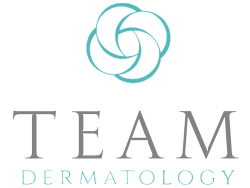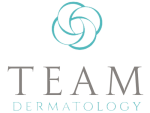
Skin cancer is the most common cancer in the U.S., with the American Academy of Dermatology estimating that one in five Americans will have it at some point in their lives.
If you’re looking for advanced skin cancer treatments in Sugar Land, Texas, it’s important to choose a provider who offers comprehensive and compassionate care.
At Team Dermatology, we’re committed to providing advanced care to protect your skin and restore its health.
Table of Contents
What Skin Cancer Looks Like
Skin cancer can show up in different ways, and knowing what to watch for is key to catching it early. Some common signs include:
- Unusual or non-healing spots or sores
- Moles or freckles that change in size, shape, or color
- Shiny, pearly bumps on sun-exposed areas
- Red, scaly, or rough patches
Checking your skin regularly and seeing a dermatologist when something looks off can make a big difference. The sooner it’s caught, the easier it is to treat.
How To Tell If You Have Skin Cancer
While only a dermatologist can diagnose skin cancer, there are signs that may suggest you should schedule a skin check. Remember the ABCDE Rule.
- Asymmetry: One half doesn’t match the other.
- Border: Irregular or poorly defined edges.
- Color: Varied shades of brown, black, or other colors.
- Diameter: Larger than 6mm (about the size of a pencil eraser).
- Evolving: Any changes in size, shape, or color over time.
If you notice any of these warning signs, it’s best to have a dermatologist take a closer look. At Team Dermatology, we’ve helped many patients become cancer-free through early detection.
Types of Skin Cancer
Skin cancer comes in several forms, with three being the most common:
Basal Cell Carcinoma (BCC)
Basal cell carcinoma is the most common type and tends to grow slowly. It often appears on areas that get the most sun, like the face or neck. BCC can show up as a small, shiny bump, a pink patch, or a sore that doesn’t heal.
While it rarely spreads to other parts of the body, it can cause damage to the surrounding skin if left untreated.
Squamous Cell Carcinoma (SCC)
Squamous cell carcinoma is more aggressive than BCC and can sometimes spread if not caught early.
It usually looks like a rough, red patch or a scaly, crusted bump that may bleed. Like BCC, it’s most common in areas that get a lot of sun, such as the scalp, ears, or hands.
Melanoma
Melanoma is the most serious form of skin cancer but also the least common. It can develop in an existing mole or appear as a new dark spot on the skin, often with irregular borders and multiple colors.
Melanoma can spread quickly to other parts of the body, but when caught early, it’s highly treatable.
Who’s at Risk?
Anyone can develop skin cancer, but certain factors can increase your risk:
- Frequent exposure to UV rays, whether from the sun or tanning beds, is the leading cause of skin cancer.
- Spending a lot of time outdoors or having a history of multiple sunburns
- People with fair skin, especially those who burn easily or have freckles
- A family history of skin cancer, particularly melanoma
- Age also increases the chance of developing skin cancer, with people over 50 being more susceptible.
- Those with weakened immune systems are also more vulnerable.
Skin Cancer Treatments Available in Sugar Land, TX
While the thought of having skin cancer can be overwhelming, there are effective treatments available to help.
Again, early detection can make all the difference. When caught early, skin cancer is much easier to treat, and the chances of it spreading or causing serious damage are much lower.
That’s why regular skin checks and paying attention to any changes are so important. At Team Dermatology, we offer a range of advanced treatment options, tailored to each patient’s needs.
Skin Cancer Excision
Skin cancer excision is a simple surgery where a doctor removes the cancerous spot along with a small amount of healthy skin around it to make sure all the cancer is gone. This helps lower the chance of the cancer coming back.
It’s often used for common types of skin cancer, like basal and squamous cell carcinoma. The procedure is usually done with local anesthesia to numb the area, and how big or deep the cut is depends on the size of the cancer.
Recovery is usually quick, though there might be some scarring depending on the size of the spot.
Mohs Surgery
Mohs surgery is a highly precise and minimally invasive treatment, especially effective for skin cancers in sensitive areas like the face.
The procedure is performed in stages, where thin layers of skin are removed, frozen and examined under a microscope until no cancer cells are detected.
This precise approach minimizes the removal of healthy tissue, reduces scarring, and often allows for quicker recovery.
Cryosurgery
Cryosurgery uses extreme cold, often liquid nitrogen, to freeze and destroy abnormal skin cells. It’s commonly used for small or early-stage skin cancers, as well as precancerous lesions like actinic keratosis.
Topical or Injection Chemotherapy
In topical chemotherapy, a cream containing cancer-fighting drugs is applied directly to the skin, targeting cancerous cells without affecting the rest of the body. This treatment is typically used for early-stage basal or squamous cell carcinomas.
Electrodessication and Curettage (ED&C)
This technique involves scraping away the cancerous tissue with a special tool, followed by the use of heat (electrodessication) to destroy any remaining cancer cells. ED&C is most often used for smaller basal and squamous cell cancers.
Immunotherapy
Immunotherapy boosts the body’s own immune system to fight cancer. It’s a newer approach, typically used for more advanced cases of melanoma, and can be an effective option when other treatments aren’t suitable. Immunotherapy may be applied topically or taken as an oral or intravenous medication.
Choosing a Skin Cancer Dermatologist in Sugar Land, TX
One of the most important things to look for when a Texas skin cancer dermatologist is whether they are board-certified. This means they’ve completed extensive training, passed rigorous exams, and stay current on the latest in dermatology, especially when it comes to skin cancer.
Our board-certified dermatologist, Dr. Asra Ali and board-certified physician assistant, Laura Nguyen, bring both expertise in medical and cosmetic dermatology, providing a personalized approach to every patient.
We offer advanced treatments, like Mohs surgery, to ensure precise and effective care. With a focus on early detection and minimally invasive options, you can feel confident that your skin is in good hands.
Your skin deserves expert care, and finding a board-certified dermatologist in Sugar Land, TX is an essential step in getting the best treatment for your long-term health. We serve patients in and around Memorial and Sugar Land, Texas, including areas like Richmond, Rosenberg, Stafford, Missouri City, and surrounding communities.

